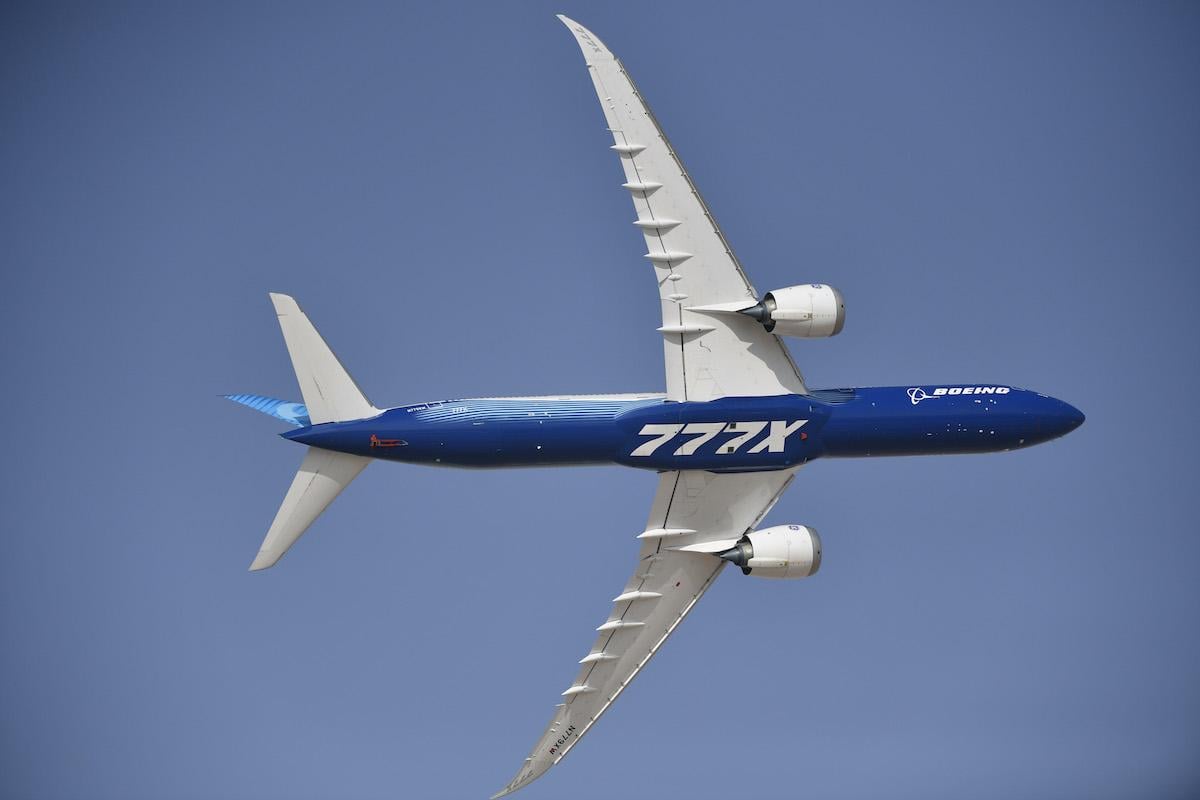
Boeing is close to defining the freighter version of the 777X after discussions with cargo airlines and is thought to be narrowing in on a configuration based on a revised 777-8 derivative.
Although there has been speculation Boeing might offer a 777XF sized between the 777-8 and the 777-9—in a similar move to the A350-950F launched by Airbus which sits between the A350-900 and -1000 versions—the manufacturer is believed to have refocused on a larger 777-8 passenger baseline. The move, prompted by input from commercial carriers for more capacity on the 777-8, also appears to have produced an optimum size for a freighter.
“Until we launch the aircraft we don't formally pin down all the specifications,” says Tom Sanderson, director of product marketing, 787 Product Development and Boeing’s Confident Travel Initiative. “The challenge with freighters is always you are balancing payload against volume. Higher density tends to be higher value and in long-haul cargo, weight is favored, in which case body length is less sensitive because you typically will hit the weight limit first.”
However, Sanderson adds that the growth of the e-commerce market drives other considerations in which low-density freight is key. “In that case, cargo volume is much more important and it tends to drive you higher. So we are absolutely in those discussions and somewhere between the two [is] I think … a reasonable assumption,” he adds.
As currently defined, the 777-8 is a shortened 229-ft.-long derivative of the 242-ft.-long 777-9. However, with added body length on the 777-8 baseline and a higher maximum take-off weight (MTOW) than previously discussed numbers of 775,000 lb. and 788,000 lb., it is likely the 777XF will be offered with an even higher capacity that what had been expected. Cargo sources tell ShowNews a likely MTOW target is around 805,000 lb., compared to 766,800 lb. for the current 777-200LR-based 777F model.
Boeing meanwhile says that although flight control changes required by regulators for the 777-9 have yet to be installed and tested, the manufacturer remains confident the extended 777-9 certification campaign will likely be completed just under two years from now—putting it on track for certification and first deliveries in the last quarter of 2023.
The approximate 44-month schedule from first flight of the 777-9 in January 2020 to projected type certification in around October 2023 compares to 10 months and 20 months to achieve the same milestones on the original 777 and 787 respectively.
Although the actual certification timing will depend on regulators, “it speaks to the amount of time that we've had on this airplane to fly it and to be able to work out any of the issues that we have had and get them incorporated,” says Mike Fleming, senior vice president of the 737 MAX return to service, Commercial Customer Support and Commercial Derivative Programs. “We were very deliberate back in the beginning of this year when we moved the schedule on the 777X to encompass the changes that we've seen in the regulatory environment and changes that we wanted to make onto the airplane as well.”
The four test aircraft have amassed more than 1,700 flight hours out of what is expected to be a roughly 3,500-hour total test campaign, or in the same “ballpark” as the 777 and 787 programs, says Fleming. “When we look at where we are right now, we still believe that we'll be positioned to certify the airplane and to deliver to our customers in late 2023.”
Type inspection authorization (TIA) from the FAA—the moment from which flight tests will count as credit towards certification—has yet to be granted and Fleming says Boeing’s team is “busy working hard to get that level of documentation in place and in the regulator's hands so that we can move forward with our final inspection authorization.” ShowNews understands, however, that ground certification tests—which do not require TIA—are now underway on at least one of the four development aircraft.

Comments